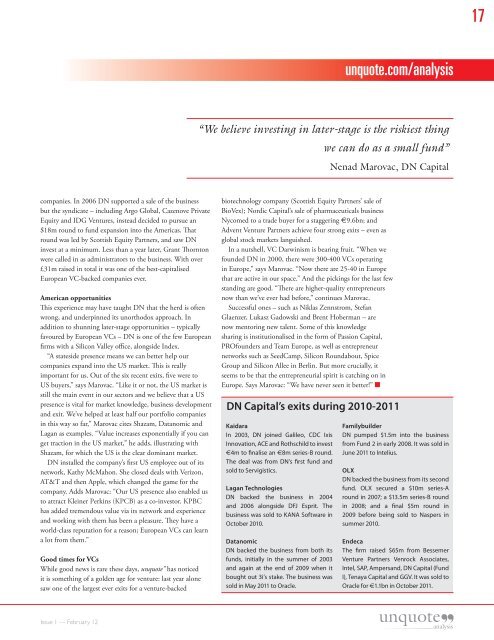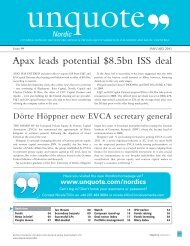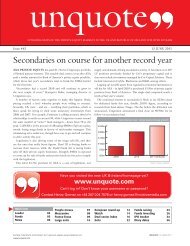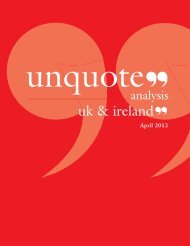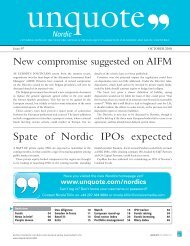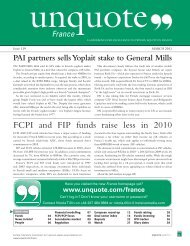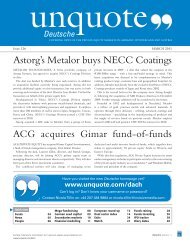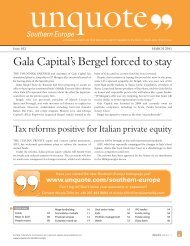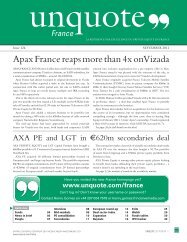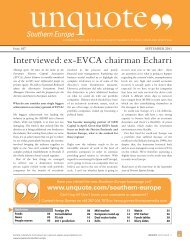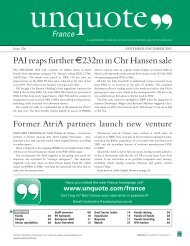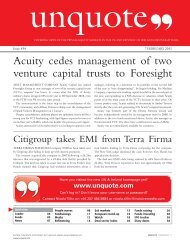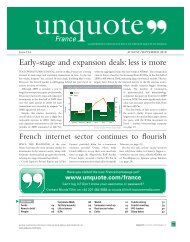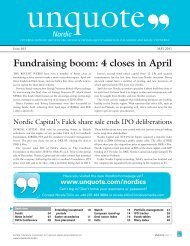latest digital edition of UK & Ireland unquote
latest digital edition of UK & Ireland unquote
latest digital edition of UK & Ireland unquote
Create successful ePaper yourself
Turn your PDF publications into a flip-book with our unique Google optimized e-Paper software.
17<br />
<strong>unquote</strong>.com/analysis<br />
“We believe investing in later-stage is the riskiest thing<br />
we can do as a small fund”<br />
Nenad Marovac, DN Capital<br />
companies. In 2006 DN supported a sale <strong>of</strong> the business<br />
but the syndicate – including Argo Global, Cazenove Private<br />
Equity and IDG Ventures, instead decided to pursue an<br />
$18m round to fund expansion into the Americas. That<br />
round was led by Scottish Equity Partners, and saw DN<br />
invest at a minimum. Less than a year later, Grant Thornton<br />
were called in as administrators to the business. With over<br />
£31m raised in total it was one <strong>of</strong> the best-capitalised<br />
European VC-backed companies ever.<br />
American opportunities<br />
This experience may have taught DN that the herd is <strong>of</strong>ten<br />
wrong, and underpinned its unorthodox approach. In<br />
addition to shunning later-stage opportunities – typically<br />
favoured by European VCs – DN is one <strong>of</strong> the few European<br />
firms with a Silicon Valley <strong>of</strong>fice, alongside Index.<br />
“A stateside presence means we can better help our<br />
companies expand into the US market. This is really<br />
important for us. Out <strong>of</strong> the six recent exits, five were to<br />
US buyers,” says Marovac. “Like it or not, the US market is<br />
still the main event in our sectors and we believe that a US<br />
presence is vital for market knowledge, business development<br />
and exit. We’ve helped at least half our portfolio companies<br />
in this way so far,” Marovac cites Shazam, Datanomic and<br />
Lagan as examples. “Value increases exponentially if you can<br />
get traction in the US market,” he adds, illustrating with<br />
Shazam, for which the US is the clear dominant market.<br />
DN installed the company’s first US employee out <strong>of</strong> its<br />
network, Kathy McMahon. She closed deals with Verizon,<br />
AT&T and then Apple, which changed the game for the<br />
company. Adds Marovac: “Our US presence also enabled us<br />
to attract Kleiner Perkins (KPCB) as a co-investor. KPBC<br />
has added tremendous value via its network and experience<br />
and working with them has been a pleasure. They have a<br />
world-class reputation for a reason; European VCs can learn<br />
a lot from them.”<br />
Good times for VCs<br />
While good news is rare these days, <strong>unquote</strong>” has noticed<br />
it is something <strong>of</strong> a golden age for venture: last year alone<br />
saw one <strong>of</strong> the largest ever exits for a venture-backed<br />
biotechnology company (Scottish Equity Partners’ sale <strong>of</strong><br />
BioVex); Nordic Capital’s sale <strong>of</strong> pharmaceuticals business<br />
Nycomed to a trade buyer for a staggering €9.6bn; and<br />
Advent Venture Partners achieve four strong exits – even as<br />
global stock markets languished.<br />
In a nutshell, VC Darwinism is bearing fruit. “When we<br />
founded DN in 2000, there were 300-400 VCs operating<br />
in Europe,” says Marovac. “Now there are 25-40 in Europe<br />
that are active in our space.” And the pickings for the last few<br />
standing are good. “There are higher-quality entrepreneurs<br />
now than we’ve ever had before,” continues Marovac.<br />
Successful ones – such as Niklas Zennstrom, Stefan<br />
Glaenzer, Lukasz Gadowski and Brent Hoberman – are<br />
now mentoring new talent. Some <strong>of</strong> this knowledge<br />
sharing is institutionalised in the form <strong>of</strong> Passion Capital,<br />
PROfounders and Team Europe, as well as entrepreneur<br />
networks such as SeedCamp, Silicon Roundabout, Spice<br />
Group and Silicon Allee in Berlin. But more crucially, it<br />
seems to be that the entrepreneurial spirit is catching on in<br />
Europe. Says Marovac: “We have never seen it better!” <br />
DN Capital’s exits during 2010-2011<br />
Kaidara<br />
In 2003, DN joined Galileo, CDC Ixis<br />
Innovation, ACE and Rothschild to invest<br />
€4m to finalise an €8m series-B round.<br />
The deal was from DN’s first fund and<br />
sold to Servigistics.<br />
Lagan Technologies<br />
DN backed the business in 2004<br />
and 2006 alongside DFJ Esprit. The<br />
business was sold to KANA S<strong>of</strong>tware in<br />
October 2010.<br />
Datanomic<br />
DN backed the business from both its<br />
funds, initially in the summer <strong>of</strong> 2003<br />
and again at the end <strong>of</strong> 2009 when it<br />
bought out 3i’s stake. The business was<br />
sold in May 2011 to Oracle.<br />
Familybuilder<br />
DN pumped $1.5m into the business<br />
from Fund 2 in early 2008. It was sold in<br />
June 2011 to Intelius.<br />
OLX<br />
DN backed the business from its second<br />
fund. OLX secured a $10m series-A<br />
round in 2007; a $13.5m series-B round<br />
in 2008; and a final $5m round in<br />
2009 before being sold to Naspers in<br />
summer 2010.<br />
Endeca<br />
The firm raised $65m from Bessemer<br />
Venture Partners Venrock Associates,<br />
Intel, SAP, Ampersand, DN Capital (Fund<br />
I), Tenaya Capital and GGV. It was sold to<br />
Oracle for €1.1bn in October 2011.<br />
Issue 1 — February 12


